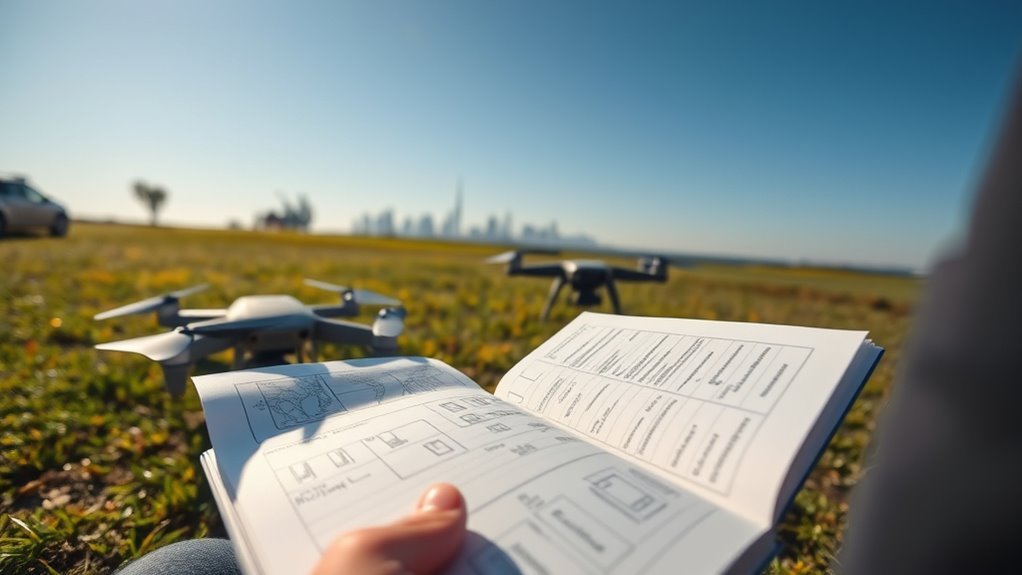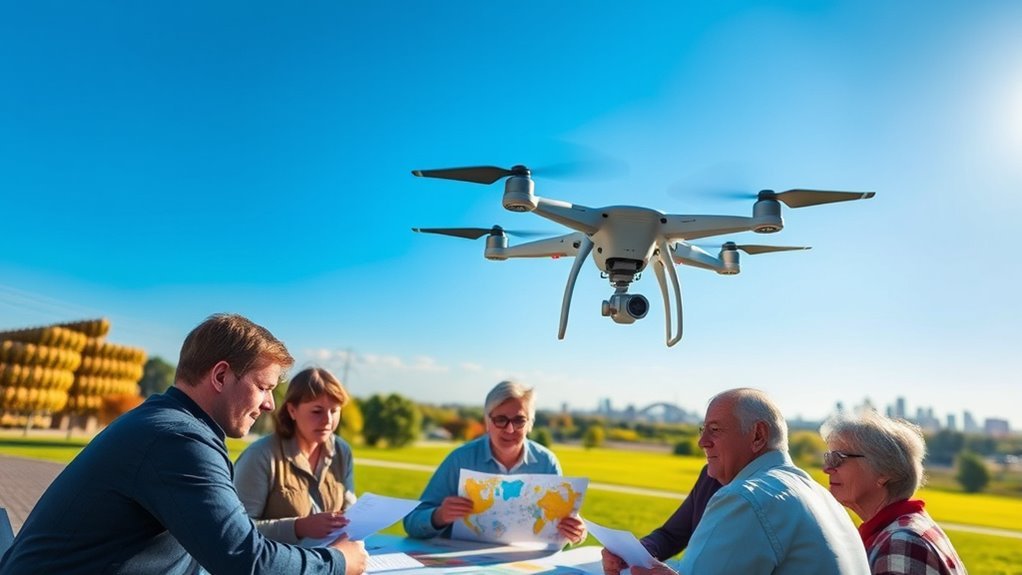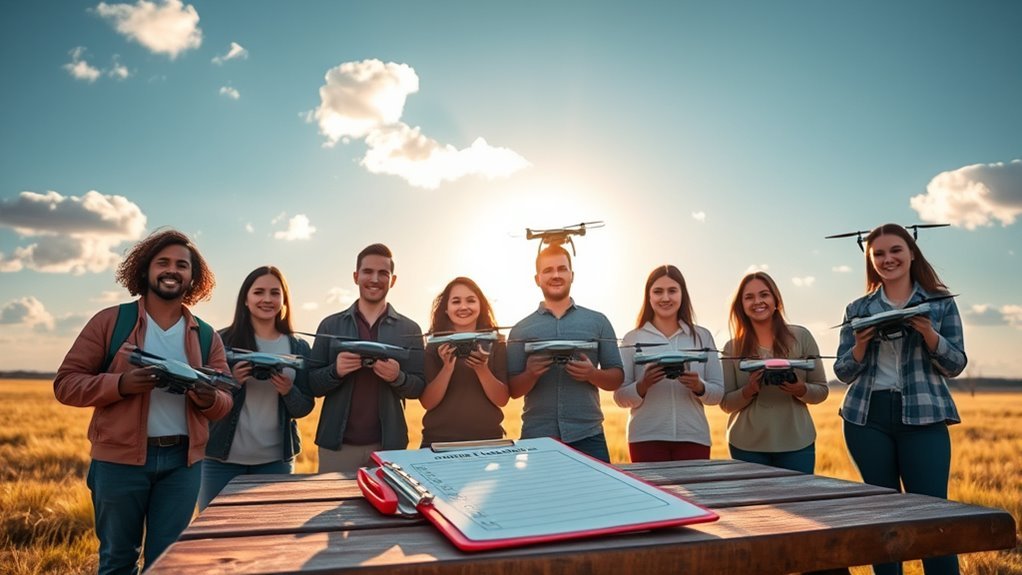To get your drone license, start by understanding the requirements, including age and knowledge of regulations. Next, choose the right certification type based on your intended use, such as Part 107 for commercial flight. Prepare for the knowledge test by studying essential materials and taking practice exams. Gain hands-on experience with flight training to hone your skills. Finally, apply for your license by submitting the necessary documents and fees. Continue on to discover more about each step in detail.
Understand the Requirements for a Drone License

To obtain a drone license, you need to meet specific requirements set by aviation authorities, which typically include age, knowledge, and training criteria. Regulatory compliance is essential in this process. Most jurisdictions enforce age restrictions, often requiring you to be at least 16 years old. This guarantees you’re mature enough to operate a drone safely and responsibly.
You’ll also need to demonstrate knowledge of airspace rules, weather conditions, and drone operation. Completing a training program or passing a written exam may be required to prove your understanding. As you navigate these requirements, remember that meeting them isn’t just about obtaining freedom to fly—it’s also about securing safety for yourself and others in the airspace. Embrace this responsibility as you pursue your drone license.
Choose the Right Certification Type

While selecting the right certification type for your drone operations, it’s essential to take into account your intended use, whether for recreational flying or commercial purposes. Here’s a quick overview:
| Certification Type | Intended Use | Key Requirements |
|---|---|---|
| Part 107 | Commercial Use | Knowledge test, registration |
| Section 44809 | Recreational Use | No license required, guidelines follow |
| 333 Exemption | Specific Commercial Use | Detailed application process |
| Remote Pilot Certificate | Both Uses | Knowledge test, medical exam |
Understanding these distinctions guarantees you select the appropriate path that aligns with your flying aspirations. If you’re pursuing freedom in the skies, choosing the right certification type is your first step toward that goal.
Prepare for the Knowledge Test

After selecting the right certification type, the next step involves preparing for the knowledge test, a significant requirement for many drone operations. To succeed, gather appropriate study materials such as the FAA’s Remote Pilot – Small Unmanned Aircraft Systems Study Guide. Familiarize yourself with regulations, airspace classifications, and weather effects on drone performance. Additionally, understanding flight time can significantly influence your choice of drone for specific missions.
Utilize test-taking strategies like taking practice exams to identify weak areas and reinforce your knowledge. Time management during the actual test is essential; simulate test conditions to build your confidence. Don’t forget to review key concepts regularly. With structured preparation and effective strategies, you’ll not only pass the test but also enhance your skills as a drone pilot, paving the way for exciting operational freedom. Additionally, understanding advanced camera capabilities can help you appreciate the technical aspects of drones, which may be beneficial for practical applications in the field.
Complete the Flight Training
Completing the flight training is essential for becoming a proficient drone pilot, as hands-on experience solidifies the knowledge gained during your studies. You’ll want to engage in flight maneuvers practice to develop your skills and confidence. This involves executing various maneuvers like turns, climbs, and descents under different conditions. It’s also critical to conduct a thorough safety protocols review before each flight. This guarantees you’re aware of potential hazards and can mitigate risks effectively. Familiarize yourself with emergency procedures, airspace regulations, and equipment checks. By combining practical experience with a solid understanding of safety, you’ll be well-prepared to enjoy the freedom that comes with piloting your drone responsibly and skillfully. Embrace this training phase; it’s where you’ll truly learn to soar.
Apply for Your Drone License
Once you’ve gained sufficient flight experience, it’s time to navigate the application process for your drone license. This step is essential for achieving the freedom to fly legally and safely. Here’s how to get started:
Once you’ve built up your flight experience, it’s crucial to begin the drone license application process for safe and legal flying.
- Gather Required Documents: Confirm you have your flight training certificate and identification ready.
- Complete the Application Form: Fill out the necessary forms accurately, providing all requested information.
- Pay Licensing Fees: Be prepared to cover the licensing fees, which can vary based on your location and type of license.
Frequently Asked Questions
How Long Does the Drone Licensing Process Take?
The drone licensing process varies, but you can expect an application timeline of several weeks. Testing requirements typically include a knowledge exam, which can further extend the wait time before you receive your license.
Can I Fly My Drone Commercially Without a License?
You can’t fly your drone commercially without a license. For instance, a photographer offering aerial shots for events without proper certification risks hefty fines due to drone regulations governing commercial operations. Stay informed to enjoy your freedom!
What Happens if I Fail the Knowledge Test?
If you fail the knowledge test, you can explore retake options. It’s vital to enhance your test preparation, focusing on areas where you struggled, to guarantee success in future attempts and gain the freedom to fly commercially.
Are There Age Restrictions for Obtaining a Drone License?
When it comes to age restrictions, you’ll need to know the minimum age is 16. Meeting these legal requirements is essential if you want to spread your wings and enjoy the freedom of flying your drone.
Do I Need Insurance to Operate a Drone?
You don’t legally need insurance to operate a drone, but liability coverage is highly recommended. Various insurance types can protect you from damages or accidents, ensuring you maintain your freedom while flying responsibly and safely.

